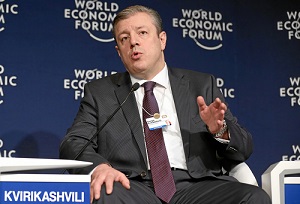Georgia’s Constitutional Reform is Good for the Ruling Party, Bad for Georgian Democracy
By Joseph Larsen
May 16, 2017, the CACI Analyst
The ongoing constitutional reform process clearly indicates that Georgia’s further democratic progress rests on shaky footing. The proposed constitutional amendments would weaken the power and popular mandate of the president and likely give the ruling Georgian Dream (GD) party an undue advantage in parliamentary elections. The proposed amendments justifiably raise fears that GD is just the latest political force with ambitions for single-party rule. Rather than locking in the country’s democratic gains, the draft constitution looks likely to consolidate GD’s legislative and executive power.

Reasons for cautious optimism as post-election dust settles in Georgia
By George Tsereteli
December 8th, 2016, The CACI Analyst
Despite the negative political discourse, pessimism and apathy shown by a historically low voter turnout in Georgia’s parliamentary elections in October, there are tangible reasons to be cautiously optimistic. When compared to other post-Soviet nations, Georgia is far ahead in terms of many economic and governance indicators. The main question moving ahead is how the ruling Georgian Dream (GD) party will use its newly-gained supermajority in parliament. The hope is that the ruling party will lead in an inclusive and non-unilateral way – respecting opposition viewpoints – while enacting responsible policies and reforms.
Georgia’s prime minister visits Armenia
By Erik Davtyan
October 3rd, the CACI Analyst
On September 5, Georgia’s Prime Minister Giorgi Kvirikashvili, along with Vice Prime Minister and Minister of Energy Kakha Kaladze, and Deputy Minister of Foreign Affairs David Dondua, paid a one-day visit to Yerevan. Kvirikashvili has previously visited Armenia as Minister of Economy and Sustainable Development, however this was his first official visit after he became Prime Minister in December 2015. The visit came nearly a month before parliamentary elections in Georgia, which are set for October 8. Less than one week before, Kvirikashvili made a similar visit to Azerbaijan. During both visits, the Georgian delegation was composed of exactly the same level of representatives, although another deputy foreign minister was present in Azerbaijan – indicating the importance that Georgian authorities attach to demonstrating a balanced policy towards its two neighbor states.
Real friends? Georgia-Turkey relations in the wake of the July 15 coup attempt
By Boris Ajeganov
August 10th, 2016, The CACI Analyst
Georgian PM Giorgi Kvirikashvili became the first foreign head of state to visit Turkey after the failed coup attempt by parts of the Turkish military in the evening of Friday, July 15. Kvirikashvili met with his counterpart, PM Binali Yildirim, and President Erdoğan in Ankara on July 19 as part of an inaugural meeting of the High Level Georgia-Turkey Strategic Cooperation Council. The visit — the PM’s first official to Turkey — was planned long before the attempted coup. Although the event focused on bilateral trade and economic issues, both parties emphasized that the official visit demonstrated Georgia’s continued support for Turkey’s democratically elected authorities, despite concerns that Erdoğan used the coup attempt as pretext for a major purge of political opponents at all levels of government. In the end of the day, regardless of what direction Turkey’s politics take, Georgia does not have much of a choice but to toe its neighbor’s line, come rain or shine.
Despite Georgia-Azerbaijan gas deal, distrust is sown
By Boris Ajeganov
March 7th, 2016, The CACI Analyst
Uncertainty on the future of Georgia’s energy security has been growing since late 2015, when Georgia’s minister of energy and deputy PM Kakha Kaladze met with Alexey Miller, CEO of Russia’s Gazprom twice in the span of a month. Discussions on Gazprom’s potential return to the Georgian market quickly raised eyebrows in Baku and caused popular protests in Tbilisi. In a March 4 turnaround, Kaladze announced a deal to receive additional gas from Azerbaijan, thus removing the need to import Russian gas. Party politics aside, Tbilisi appears to have skillfully used its strategic position in the South Caucasus to secure a favorable energy deal without sacrificing its sovereignty.







